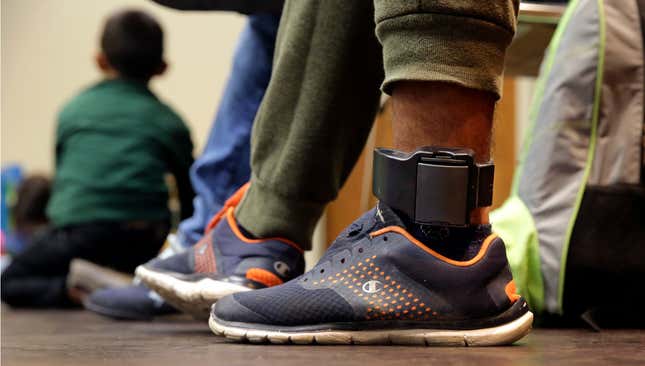
As cities and towns across America come to grips with the country’s mass incarceration problem, many jurisdictions are looking to digital surveillance, particularly ankle monitors, for solutions. But as a new report detailing Chicago’s use of electronic monitoring reveals, these technologies can be every bit as harmful to the people wearing them as putting them behind bars—and, depending on how officials use the data these devices capture, they may even be unconstitutional.
A new report from the Appeal looks at Cook County’s new contract with an electronic monitoring company, Track Group, which produces the GPS-based ankle monitor the ReliAlert XC3. Cook County officials began using the device in February, citing its extended battery life and more secure band. It’s currently being used on all children on probation in Chicago, including pretrial defendants.
What makes the monitors so remarkable is that they have two-way communication abilities (read: microphones and speakers), meaning police can actually call kids through the monitors. There is no way for someone wearing a device to decline an incoming call; as far as who’s able to track the wearer, the Appeal reports that officers at the Cook County criminal court and Track Group employees at the company’s monitoring center are capable of calling the wearer at any time.
But it appears it’s not always clear when the device has been activated.
From The Appeal:
In 2014, a technician for Track Group, which was then called SecureAlert, testified during a hearing in Puerto Rico that although the device is supposed to vibrate and make a noise when it’s activated, the listening and speaking capabilities can be turned on without warning.
Even if children are alerted when they receive a call, attorneys said issues of consent remain. In 2014, Illinois passed a wiretapping law that made it illegal to use an “eavesdropping device” to overhear or record a conversation without the consent of all parties involved.
Not surprisingly, some of the kids currently wearing the monitors and their families suspect the officials are listening to them even when they’re not picking up the calls. And privacy and civil liberties advocates warn the potential for misuse and surveillance is high with these kinds of devices. As several experts told the Appeal, it’s possible those recordings could end up being used against the kids in criminal cases involving them or their contacts.
The way the data from these devices is being stored also raises questions about who will be able to access the recordings, and to what end. According to Track Group’s contract with Cook County, all calls made through the ReliAlert XC3 are “recorded, time-stamped, and archived, and are stored on Track Group’s servers for 18 months,” the Appeal writes.
According to a 2016 Pew study, the use of ankle monitors and other electronic tracking devices more than doubled between 2005 and 2015. Billed as a more humane alternative to incarceration, digital tracking companies and the jurisdictions that use their services promise supervision without the dehumanizing experience of being in a physical cage.
Cook County is one of those places, expanding their use of electronic monitoring as they’ve looked to implement other reforms to reduce their prison and jail populations.
But criminal justice advocates say digital monitoring is just incarceration in another form—one that combines all the worst aspects of America’s mass incarceration crisis and repackages it for a new millennium.
In an op-ed for the New York Times published last year, Michelle Alexander, author of the seminal work, The New Jim Crow, referred to digital monitoring of people who would otherwise be imprisoned as “e-carceration.” In the article, Alexander likened to the relationship between ankle monitors and brick-and-mortar jails to Jim Crow and slavery.
“Hopefully we can now see that Jim Crow was a less restrictive form of racial and social control, not a real alternative to racial caste systems,” Alexander wrote. “Similarly, if the goal is to end mass incarceration and mass criminalization, digital prisons are not an answer. They’re just another way of posing the question.”
It follows that black youth could be disproportionately affected—and potentially surveilled—by the new monitors. A 2016 study found black youth make up two-thirds of all juvenile inmates in Illinois.
Among the concerns is that the monitors—which are highly visible—would be a sort of scarlet letter at school or at their jobs, effectively discouraging them from the sorts of activities and institutions meant to keep them from getting in trouble. The devices also introduce new ways to violate parole because of technical violations related to the monitors—like whether the wearer keeps them charged or travels to a restricted area. Thus, it opens another avenue back into incarceration.
As of last Friday, a Cook County official told the Appeal that the Office of the Chief Judge would instruct Track Group “to disable the recording capabilities of the system” while the county reviews privacy concerns related to the recordings.
But it’s worthwhile to note there’s some evidence showing this kind of surveillance isn’t even necessary to fulfill a court’s ultimate goal: to get the wearer to appear at trial.
As the Appeal notes, a 2012 Pretrial Justice Institute study found nearly 90 percent of people “would return to court with little more than a reminder of their court date.”

